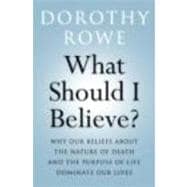
What is included with this book?
| Religion in the Twenty-first Century | |
| What It Is to Be Human | |
| "Hemmed in a Cirque of Our Own Creating' | |
| Very Different Points of View | |
| Being Good and the Just World | |
| Trying to Be Good | |
| How We Acquire Our Beliefs | |
| The Consequences of Our Beliefs | |
| Table of Contents provided by Publisher. All Rights Reserved. |
The New copy of this book will include any supplemental materials advertised. Please check the title of the book to determine if it should include any access cards, study guides, lab manuals, CDs, etc.
The Used, Rental and eBook copies of this book are not guaranteed to include any supplemental materials. Typically, only the book itself is included. This is true even if the title states it includes any access cards, study guides, lab manuals, CDs, etc.